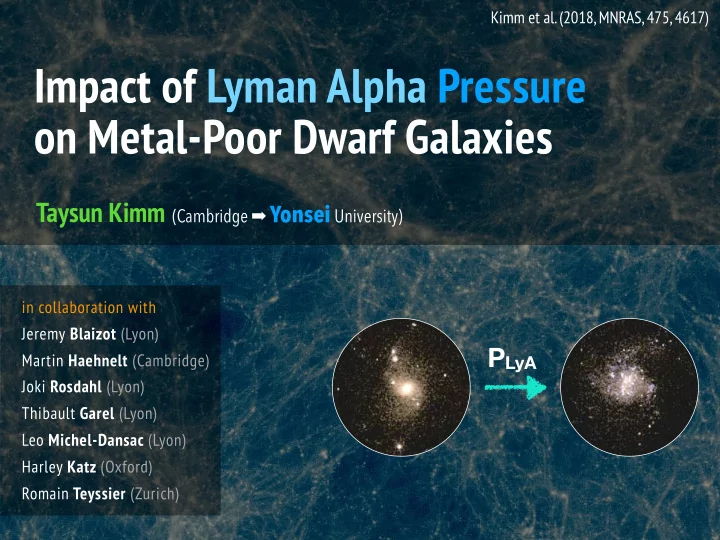

Kimm et al. (2018, MNRAS, 475, 4617) Impact of Lyman Alpha Pressure on Metal-Poor Dwarf Galaxies Taysun Kimm (Cambridge ➡ Yonsei University) in collaboration with Jeremy Blaizot (Lyon) P LyA Martin Haehnelt (Cambridge) Joki Rosdahl (Lyon) Thibault Garel (Lyon) Leo Michel-Dansac (Lyon) Harley Katz (Oxford) Romain Teyssier (Zurich)
Introduction Common feature of SFRs - Outflows M82: local starburst Ubiquitous Outflows in LBGs at z~2 (Steidel+10) Red (0.3-1.1 keV); 3x10 6 -10 7 K Green (0.7-2.2 keV); 7x10 6 -2x10 7 K Blue (2.2-6 kev); 2x10 7 -6x10 7 K (Credit: Chandra) observer Heckman+(15; z~0 local starburst) Tokyo 30/March/2018 2
Introduction Lyman alpha profile on cloud scales c.f. Neufeld (90;91); Zheng+(02); Verhamme et al. (06,12); Post-processing with RASCAS (Jeremy Blaizot’s talk) Dijkstra et al. (06); Gronke & Dijkstra (15) Radiation-Hydrodynamic simulations of a turbulent cloud with M cloud =10 6 M sun , SFE=1% recombination+collisional radiation Kimm, Blaizot et al. (in prep) Tokyo 30/March/2018 3
Lya pressure Scattering of LyA photons transfers momentum to the surroundings Why do we care? Optical depth to LyA is huge! Solution to the Over-cooling problem at high z? Momentum transfer Multiplication factor See also Dijkstra & Loeb (08), Smith et al. (16) Kimm, Cen, Devriendt+(15) 4 Tokyo 30/March/2018
Lya pressure Scattering of LyA photons transfers momentum to the surroundings See also Dijkstra & Loeb (08), Smith et al. (17) Dust-free Dusty Multiplication factor Dust-to-metal ratio: Remy-Ruyer+(14) 5 Tokyo 30/March/2018
Lya pressure Momentum budget from Lya pressure Lya SNe Photo-ionization heating LyC Lyman alpha pressure • The momentum from Lya is comparable or more significant than that of SNe • Lya pressure is advantageous from a computational viewpoint as well 6 Tokyo 30/March/2018
Lya pressure Radiation-hydrodynamic simulations of an isolated disk Input physics Simulation set-up M DMH ~10 10 M sun RAMSES-RT (Teyssier 02; Rosdahl+13) • Thermo-turbulent star formation scheme (Kimm+17) • Momentum-conserving SNe (Kimm & Cen 14, Kimm+15) • Non-equilibrium photo-chemistry with H 2 (Katz,Kimm+17) • Photo-ionisation heating (Rosdahl+13) • Direct radiation pressure (Rosdahl+13) • RP by reprocessed IR photons (Rosdahl & Teyssier 15) • Photoelectric heating on dust (Kimm+17) • Lya pressure (Kimm+18) Z=0.02 Z sun M star = 2x10 8 M sun M gas =1.7x10 8 M sun Max Resolution: 2 - 5 pc 7 Tokyo 30/March/2018
Lya pressure Radiation-hydrodynamic simulations of an isolated disk PhotoHeating+Direct Radation Pressure +IR Pressure +SN explosions + Lya Pressure 8 Tokyo 30/March/2018
Lya pressure Radiation-hydrodynamic simulations of an isolated disk 9 Tokyo 30/March/2018
Lya pressure Where does Lya operate? • Requirement for strong Lya pressure - Luminous ionizing source - Large N HI density → around young stars → interrupt SF quickly (<5Myr) • Effective M F ~ 200-300 in dense regions 10 Tokyo 30/March/2018
Lya pressure Cluster Formation with LyA Feedback • Fewer clusters form and survive when strong radiation feedback is present (caution: cluster formation in HD simulations…) [see also Abe & Yajima 18] 11 Tokyo 30/March/2018
Lya pressure Star formation histories of a gas-rich, metal-poor dwarf R+Lya R+SN R+SN+Lya • Suppression of Star formation Lya < SN < SN+Lya 12 Tokyo 30/March/2018
Lya pressure Weaker outflows with Lya pressure w/o Lya w/ Lya With Lya pressure • Mass-loading factor is decreased • Outflows become cooler and slower 13 Tokyo 30/March/2018
Lya pressure A picture with strong radiation feedback No or Weak Radiation Feedback Coherent Supernova Feedback Strong Radiation Feedback Less coherent Supernova Feedback 14 Tokyo 30/March/2018
Lya pressure Weaker outflows with Lya pressure w/o Lya w/ Lya With Lya pressure • Mass-loading factor is decreased • Outflows become cooler and slower 15 Tokyo 30/March/2018
Summary • LyA photons resonantly scatter with HI, and impart 100-300 times more momentum than the single-scattering case (L Lya /c) in the metal-poor regime • Isolated gas-rich, metal-poor dwarf galaxy test: - Total stellar mass : suppressed by a factor of ~2 - weaker outflows (mass loading~a few at 0.2 Rvir) - Star clusters are more difficult to form and survive -> important for GC formation - Strong RP does not necessarily lead to stronger outflows (due to self-regulated SF) • (Partial) Solution to the over-cooling problem in galaxy formation simulations 16 Tokyo 30/March/2018
Recommend
More recommend